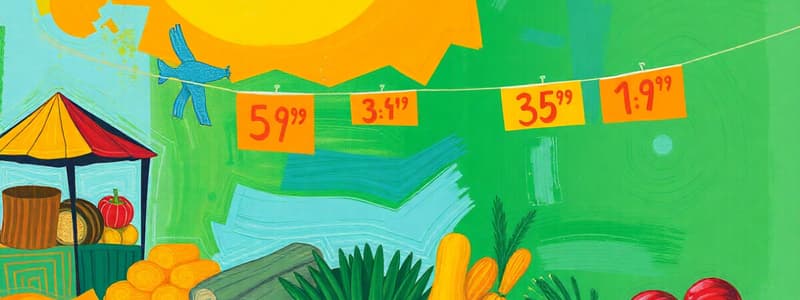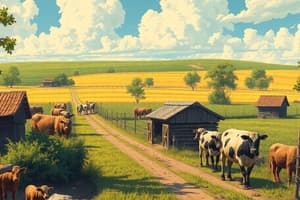Podcast
Questions and Answers
What is a key characteristic that makes a story compelling for entrepreneurs?
What is a key characteristic that makes a story compelling for entrepreneurs?
- It needs to be inspiring. (correct)
- It should be complex and hard to understand.
- It should include only financial facts.
- It must be told in a chronological order.
What is the minimum number of people required to form a cooperative?
What is the minimum number of people required to form a cooperative?
- 2 persons
- 10 persons
- 30 persons
- 15 persons (correct)
Which of the following is not a success factor for starting a business?
Which of the following is not a success factor for starting a business?
- Technical and Production
- Inherited wealth (correct)
- Market
- Self-assessment
Which type of business structure typically involves two persons?
Which type of business structure typically involves two persons?
Which of the following is considered the lifeblood of a business?
Which of the following is considered the lifeblood of a business?
What describes the pricing model for commodities in agriculture?
What describes the pricing model for commodities in agriculture?
Which of the following is NOT a trend in agricultural enterprise?
Which of the following is NOT a trend in agricultural enterprise?
Which attitude reflects a proactive approach to farming challenges?
Which attitude reflects a proactive approach to farming challenges?
What is a common reason for individuals not to invest?
What is a common reason for individuals not to invest?
Which of the following correctly categorizes types of cultural commodities?
Which of the following correctly categorizes types of cultural commodities?
Flashcards are hidden until you start studying
Study Notes
Prevailing Price
- Commodities are price takers, reliant on market prices influenced by supply and demand.
- Farmers lack autonomy in setting prices for their harvests, often accepting lower market rates.
Agricultural Enterprise Trends
- Integrated Farming: Combines different agricultural practices for enhanced productivity.
- Trading: Engaging in the buying and selling of produce to generate profit.
- Value Adding: Involves processing commodities to increase their market value.
- Organic Farming: Focuses on sustainable practices and organic inputs to cultivate crops.
Different Attitudes of Farmers
- Hard Pressed: Farmers who blame external factors for their struggles.
- Ordinary Attitude: Those who rely on luck rather than proactive strategies.
- Successful Attitude: Farmers who seek solutions and take decisive actions for improvement.
Financial Literacy
- Essential for understanding investment strategies and effective saving techniques.
Reasons Not to Invest
- Laziness: Lack of motivation to engage in investment opportunities.
- Fear of Failure: Anxiety about potential losses discourages investment.
Different Types of Cultural Commodities
- Includes various categories such as crops, livestock, and other agricultural products.
How to Start Your Own Business
- Importance of storytelling in entrepreneurship to inspire and connect with others.
- Strive to be remarkable, consistent, and authentic.
- Share your entrepreneurial journey with audiences likely to resonate with it.
Agri-Entrepreneur
- Refers to individuals of any age who start and manage agricultural businesses.
Success Factors in Agriculture
- Self-Assessment: Reflection on personal strengths and weaknesses.
- Organizational and Management Skills: Essential for running a successful enterprise.
- Technical and Production Knowledge: Required for effective agricultural practices.
- Market Understanding: Knowledge of market dynamics is crucial for success.
- Financial Awareness: Key to ensuring ongoing business operations, emphasizing profitability and Return on Investment (ROI).
Types of Business Structures
- Partnership: Involves two individuals sharing ownership and responsibilities.
- Corporation: Consists of a larger number of members, offering limited liability.
- Cooperative: A collective of 15 or more individuals working together for mutual benefit.
Studying That Suits You
Use AI to generate personalized quizzes and flashcards to suit your learning preferences.




